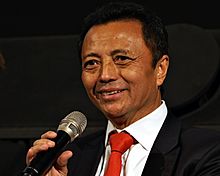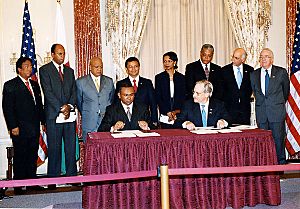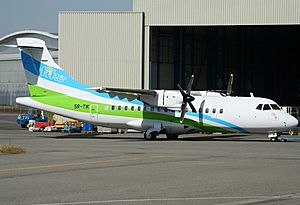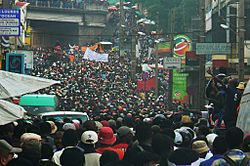Marc Ravalomanana facts for kids
Quick facts for kids
Marc Ravalomanana
|
|
|---|---|

Ravalomanana in 2017
|
|
| 6th President of Madagascar | |
| In office 5 July 2002 – 17 March 2009 |
|
| Prime Minister |
|
| Preceded by | Didier Ratsiraka |
| Succeeded by | Hyppolite Ramaroson (acting) |
| 48th Mayor of Antananarivo | |
| In office 14 November 1999 – 6 May 2002 |
|
| Preceded by | Guy Razanamasy |
| Succeeded by | Patrick Ramiaramanana |
| Personal details | |
| Born | 12 December 1949 Imerinkasinina, French Madagascar |
| Political party | TIM (I Love Madagascar) |
| Spouse |
Lalao Ravalomanana
(m. 1974) |
| Children | 4 |
Marc Ravalomanana (born on December 12, 1949) is a politician from Madagascar. He served as the sixth president of Madagascar from 2002 to 2009.
Ravalomanana grew up in a farming family near the capital city, Antananarivo. He became well-known as the person who started and led a very large dairy company called TIKO. He also created other successful businesses.
In 1999, he entered politics by starting the Tiako Iarivo party. He successfully ran for mayor of Antananarivo and served from 1999 to 2001. As mayor, he made the city cleaner and safer. In 2001, he decided to run for president. He became president in 2002 after a disagreement about the election results, where he insisted he had won the first round. During his time as president, Madagascar made big steps forward in development and its economy grew a lot each year.
However, later in his presidency, some people criticized him. They said he was becoming too controlling and mixing his business interests with government work. A disagreement with the mayor of Antananarivo, Andry Rajoelina, led to protests in 2009. Ravalomanana resigned, and Rajoelina took over with the support of the military. This change was seen by many countries as a coup d'état, which means a sudden, illegal takeover of power.
After leaving office, Ravalomanana lived outside Madagascar for a few years. He later returned and continued to be involved in politics. He ran for president again in 2018 and 2023.
Contents
Early Life and Education
Marc Ravalomanana was born on December 12, 1949, in a village called Imerinkasinina, about 40 kilometers east of Antananarivo. His parents were peddlers, meaning they traveled around selling goods, before they opened a small shop. His family belongs to the Merina people, which is the largest ethnic group in Madagascar.
From the age of five, he went to a public primary school. He walked 4 kilometers every day to get there. He often left early to sell watercress to people at the nearby train station. He continued his studies at a private school and then a technical secondary school run by Swedish missionaries.
Building a Business
After finishing school, Ravalomanana returned home and started making and selling homemade yogurts with his family. He would collect milk from farmers on his bicycle. Slowly, his business grew. In 1977, he opened his first yogurt and cheese production center.
He got a loan from the World Bank in 1982 and used it to start the Tiko company. This loan had very good conditions, which helped him sell his products at a lower price than other small dairy producers. This helped Tiko grow quickly. Tiko started with dairy products, then expanded to fruit juices, ice cream, cooking oil, and fizzy drinks. The slogan for Tiko products was Vita Malagasy, which means "Made in Madagascar."
Ravalomanana was good at building relationships that helped his company grow, even when the government made it hard for businesses. By the mid-1980s, Tiko was so successful that he could buy a large house in Antananarivo.
In 1997, the government tried to stop his plans to build a farm with special milk cows. But Ravalomanana found a way around it by breeding the cows locally. He also made deals that helped his business, like getting tax breaks on his cooking oil products. This helped him create another company called Magro in 1998, which was a wholesale company. By 2001, Magro had many warehouses across the country, helping Tiko products reach many areas.
At its peak, during Ravalomanana's time as president, Tiko employed between 1,000 and 3,000 people directly and supported over 10,000 indirectly. It was the biggest dairy producer in Madagascar. His success made him a very wealthy man.
Serving as Mayor
In 1999, Ravalomanana decided to run for mayor of Antananarivo. He spent a lot of money on his campaign, which was unusual for a mayoral race in Madagascar at the time. He won the election with 45 percent of the votes.
He served as mayor from December 1999 until he became president in May 2002. As mayor, he managed the city's money well and improved its water system and trash collection. He was seen as one of the most popular mayors in Antananarivo's history.
Becoming President
The 2001 Presidential Election
Ravalomanana ran for president in the election held on December 16, 2001. His campaign presented him as a "self-made man" who would use his business skills to help the country grow. He was 52 years old, which was younger than many other politicians, and he was not connected to the older politicians who had been in power for a long time. Many people in rural areas, who made up most of the population, supported him because he came from a farming background.
After the election, the official results showed Ravalomanana in first place with 46 percent of the votes, while the current president, Didier Ratsiraka, had 40 percent. This meant no one had won a clear majority, so a second round of voting was usually needed. However, Ravalomanana claimed he had won enough votes in the first round. After a recount, the High Constitutional Court agreed on April 29, 2002, saying he had won 51.3 percent of the vote.
Ratsiraka and his supporters did not accept this decision. Some of Ratsiraka's supporters blocked roads from the port city of Toamasina to Antananarivo. This led to months of occasional violence. Eventually, Ratsiraka gave up the race in July 2002 and left the country.
First Term as President

When Ravalomanana became president, he worked to fix the economy after the long political disagreement, which had cost Madagascar a lot of money. He introduced new laws and policies to encourage a capitalist, market-driven economy. He also looked for new trading partners beyond France, such as Germany, the United States, and South Korea.
In 2004, the World Bank approved his plan for reducing poverty, called Madagascar Naturellement (Madagascar Naturally). He also tripled the amount of protected natural areas on the island over five years. In 2004, he created an independent agency to fight corruption, which helped reduce it in the government. That same year, the International Monetary Fund agreed to cancel half of Madagascar's debt. In 2005, Madagascar was the first country to receive money from the Millennium Challenge Account, a new development fund from the United States.
Because of these efforts, Madagascar's economy grew by about seven percent each year during his presidency. His government paved hundreds of kilometers of roads in rural areas, making it easier for farmers to sell their goods. There were also big improvements in education and health. Thousands of new primary schools and classrooms were built, old buildings were fixed, and many new teachers were hired and trained. Primary school fees were removed, and students received basic school supplies.
However, the benefits of this economic growth were not shared equally. The cost of living increased for everyone, and many people, especially those with lower and middle incomes, found it harder to afford things. Critics said that the president himself benefited the most from his policies, for example, with road projects that helped his Tiko company distribute products more easily. They also said he sometimes made decisions without listening to others.
In November 2006, there was an attempted coup, or takeover, by a general. Ravalomanana's plane had to change its route when returning from Europe because of shooting near the airport. The coup attempt was not successful.
The 2006 Presidential Election
Ravalomanana ran for a second term in the presidential election held on December 3, 2006. According to the official results, he won the election with 54.79 percent of the votes in the first round, meaning he did not need a second round.
Second Term as President
During his second term, Ravalomanana updated his poverty reduction plan, renaming it the Madagascar Action Plan (MAP). This plan aimed to speed up and expand national development. It focused on eight main goals, including good governance, better infrastructure, rural development, health, strong economic growth, and protecting the environment. These goals were similar to the United Nations' Millennium Development Goals.
Education continued to improve, with more schools and teachers. The Malagasy language became the main language for teaching in early primary grades. In 2007, English was added as an official language alongside Malagasy and French.
However, in the later part of his second term, some people, both in Madagascar and other countries, criticized Ravalomanana. They accused him of becoming more controlling and of corruption.
Political Challenges and Resignation
On December 13, 2008, the government closed Viva TV, a television station owned by the mayor of Antananarivo, Andry Rajoelina. The government said an interview on Viva TV with a former head of state could cause problems. This action angered many people who were already unhappy with Ravalomanana's recent decisions. These decisions included a deal in July 2008 to lease half of Madagascar's farmland to a South Korean company and the purchase of a very expensive new presidential jet in November 2008.
Rajoelina gathered support from other opposition leaders and began leading protests in Antananarivo in January 2009. He spoke about the frustrations people felt with Ravalomanana's policies. On February 3, Ravalomanana removed Rajoelina from his position as mayor. On February 7, Rajoelina encouraged protesters to march to the president's office. The presidential guard fired on the crowd, killing 31 people and injuring more than 200.
Public anger against Ravalomanana grew stronger, and conflicts between protesters and security forces continued. On March 11, soldiers who supported the opposition took over army headquarters. Over the next few days, the army helped the opposition take control of important government buildings. On March 16, the army stormed the presidential palace. Hours later, Ravalomanana announced he was giving up power to a group of senior army officers. He later said he was forced to do so.
However, the military council then decided to transfer power directly to Rajoelina. Rajoelina was sworn in as president on March 21. Many countries considered this transfer of power to be illegal and a coup d'état.
After the Presidency
After Rajoelina took power, his government took legal action against Ravalomanana. In June 2009, Ravalomanana was fined a large amount of money and sentenced to four years in prison for alleged misuse of power, including the purchase of the presidential jet.
Ravalomanana was living outside Madagascar at the time. In August, he was sentenced to lifelong hard labor in his absence for his role in the protests and deaths. His Tiko Group also faced pressure from the new government.
To help end the political crisis, both Ravalomanana and Rajoelina were asked by the Southern African Development Community (SADC) not to run in the 2013 presidential elections. On December 10, 2012, Ravalomanana announced he would not participate and encouraged Rajoelina to do the same.
Presidential Elections 2018 and 2023
Marc Ravalomanana ran as a candidate in the Malagasy presidential elections in 2018. He made it to the second round of voting, but he lost to Andry Rajoelina.
He also ran as a candidate in the 2023 Malagasy presidential elections.
Other Activities
Ravalomanana is a very religious Christian. He took on more leadership roles in his church community as a young adult. In 2000, he was elected vice-president of the FJKM.
Ravalomanana owns a media company called Malagasy Broadcasting System (MBS), which runs radio and television stations. He speaks English very well.
Awards and Recognition
National Awards
International Awards
 Germany:
Germany:
 Grand Cross Special Class of the Order of Merit of the Federal Republic of Germany (2006)
Grand Cross Special Class of the Order of Merit of the Federal Republic of Germany (2006)
 Mauritius:
Mauritius:
Honorary Degrees
- Honorary Doctorate from University of Antananarivo (2007)
- Honorary Doctorate of Law from Abilene Christian University, Texas (2008)
See also
 In Spanish: Marc Ravalomanana para niños
In Spanish: Marc Ravalomanana para niños
 | Chris Smalls |
 | Fred Hampton |
 | Ralph Abernathy |



